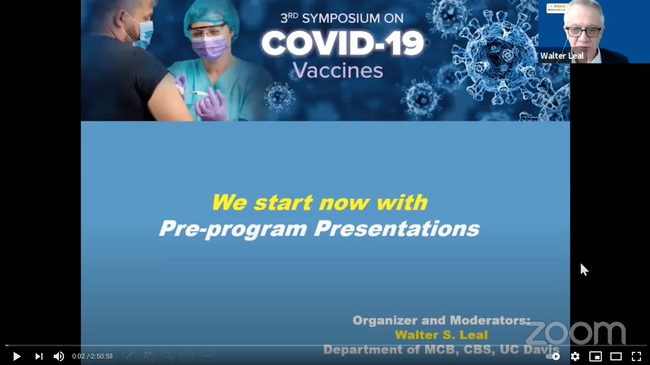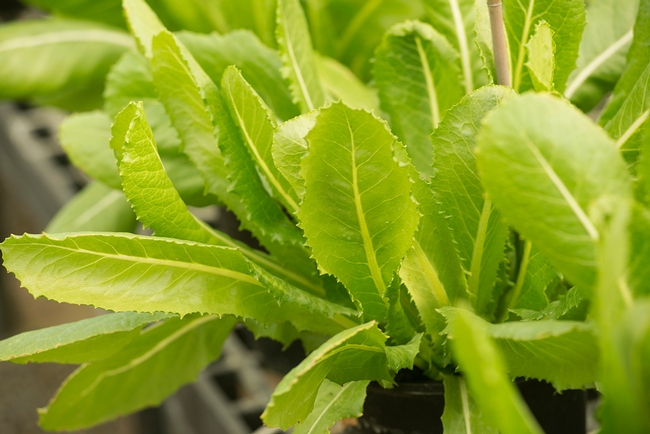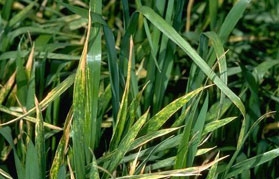
Posts Tagged: Richard Michelmore
UC Davis Symposium: Do You Have Questions on COVID-19 Tests and Vaccines?
(Note: UC Davis Distinguished Professor Walter Leal focuses his research on the...

The UC Davis Symposium on COVID-19 tests and vaccines will take place at 5 p.m., Jan. 13.

Screen shot of the third UC Davis Symposium on COVID-19. Organizer-moderator is pictured at top right.
Building a better salad to outsmart climate change

The researchers are located at UC Davis; UC Agriculture and Natural Resources Research and Extension Centers; USDA research facilities in Salinas and Beltsville; California State Polytechnic University, Pomona; and the University of Arizona, Tucson.
The UC Davis-led team aims to leverage new technologies to sustain the lettuce supply, despite the challenges posed by climate change.
“We will be exploiting genomic technology to address the needs in all areas up and down the lettuce production chain,” said project leader Richard Michelmore, a plant geneticist and director of the UC Davis Genome Center.
The team's five-year renewable grant, announced recently by USDA's Specialty Crop Research Initiative funding program, was made available through the 2014 Farm Bill.
Research will range from identifying genes that are key to developing important stress-resistance traits in lettuce to fine-tuning imaging technologies that will allow growers to remotely assess the status of their crops in the field. Although grounded in plant genetics and genomics, the project also will delve into a variety of fields that are vital for ensuring sustainable production of lettuce and related leafy greens. Collaborating team members run the gamut in terms of expertise, including plant genetics and breeding, food technology, and agricultural economics.
One of the project's strengths, Michelmore said, is its longstanding collaborative relationship with large and small plant-breeding companies as well as with the California Leafy Greens Research Board, which represents growers of lettuce, spinach and other related crops.
USDA's Specialty Crop Research Initiative, which provided the project's new grant, this year awarded $50 million in grants nationwide for projects ranging from plant genetics research to new product innovation and development of new methods for responding to food safety hazards.
First draft of genome of wheat stripe rust published in Public Library of Science

The stripe rust disease of wheat caused by the highly specialized fungal pathogen Puccinia striiformis f. sp. tritici has been responsible for recurrent episodes of large yield losses and economic hardship among grain-based agricultural societies for centuries. Current epidemics of new aggressive races of Puccinia striiformis that appear after the year 2000 pose significant threats to food security worldwide and, in particular, in developing countries in Africa and central Asia. In spite of its economic importance, the Puccinia striiformis genomic sequence is not currently available.
In order to get access to the genes of this pathogen, a team of researchers – including Professor Jorge Dubcovsky (also a Howard Hughes Medical Institute researcher) and Professor Richard Michelmore, director of the UC Davis Genome Center, Project Scientist Dario Cantu and Manjula Govindarajulu, a postdoctoral researcher in Michelmore’s lab - used cutting-edge technology to rapidly sequence a large portion of the genome of one of the Puccinia striiformis more virulent and aggressive races. They assembled long stretches of the Puccinia striiformis genome and established a preliminary automatic annotation of its genes, with a special focus on those likely to be involved in pathogenicity.
This information is available in the open-access article published by the Public Library of Science and made publically available through the National Center of Biotechnology information and a dedicated web page.
“This shotgun sequence assembly does not substitute for the need of a complete and annotated Puccinia striiformis genome, but it provides immediate access to a large proportion, more than about 88 percent, of the genes from this pathogen,” said Cantu. “This public information has the potential to accelerate a new wave of studies to determine the mechanisms used by this pathogen to infect wheat, and hopefully to reduce current yield loses caused by this pathogen.”
These researchers, in collaboration with others at the John Innes Institute in the UK, are currently sequencing new and old races of Puccinia striiformis to investigate their differences in virulence and aggressiveness.
This project was supported in part by funds provided through a grant from the Bill & Melinda Gates Foundation, and the National Research Initiative Competitive Grants from the USDA National Institute of Food and Agriculture.
